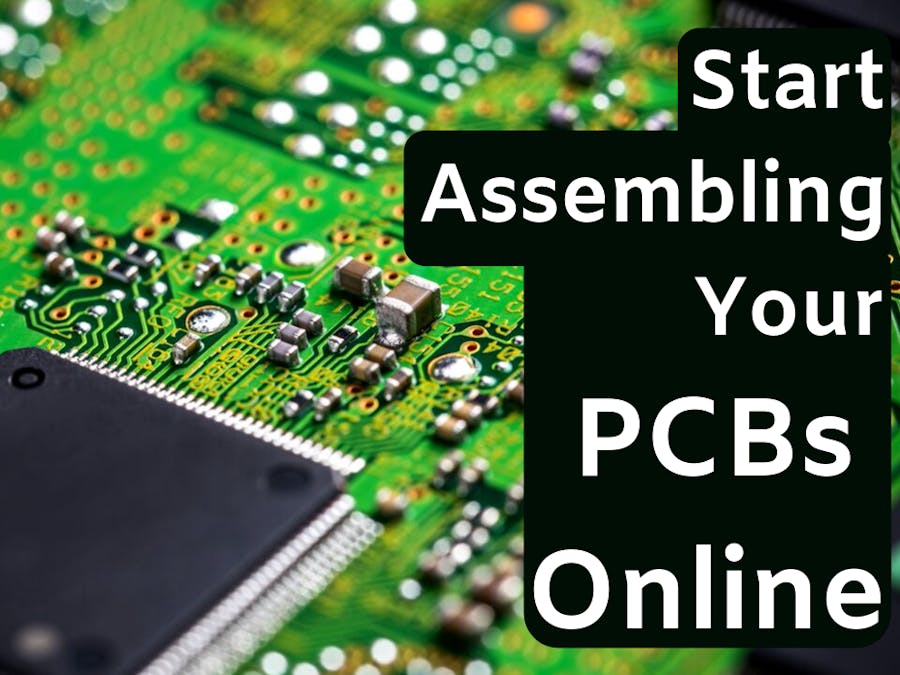Hey guys welcome back. We hobbyists, know very well how important PCBs are for DIY projects. PCBs help us to get rid of all the jumper wires hanging here and there and helps to “cleanify” the circuit. In the last post, I showed you how you can get your PCBs fabricated and delivered online using EasyEDA and JLCPCB.
How about taking it one step forward? What if we could design PCB, manufacture and get it Assembled? Yes you heard that right. Get your boards fabricated and components soldered using JLCPCB Assembly Service. Let’s get to know more about this JLCPCB Assembly Service for Online PCB Assembly and order your first PCB for your project right now!!
EasyEDA and JLCPCBEasyEDA is an easier but powerful online PCB design tool which allows electronics engineers, hackers, educators, hobbyists, makers, and enthusiasts to design and share their projects’ schematics as well as PCB layout. This is a design tool integrated LCSC components catalog and JLCPCB PCB service that helps users to save time to make their ideas into real products.
Before going further, we should know some terms regarding PCB and their components
PCB Layout for Online PCB AssemblySimply speaking, PCB layout is kind of like a map. A map that connects all components to each other using conducting tracks. It is this design we imprint on a copper cladded board which is then developed to a PCB.
Surface Mount Technology is the technique of assembling PCBs by mounting the components on the surface of the board.
Unlike the traditional method of placing the components through holes and soldering them on the other side, in SMT, the components are placed over the board and the leads are soldered on the same side.
Surface Mount Devices or SMDSurface mount device or SMD are the components that are specifically designed to be used for SMT. That means they are specifically designed to be soldered over the top of the PCB.
There are a wide variety of SMDs avalable in the market. For JLCPCB Assembly Service, the SMDs are taken from LCSC – China’s Number 1 Electronic Component Supplier.
Advantages of SMT- More efficient Usage of PCB Space
- Improved repeatability due to higher level of automation
- Complex circuits in small PCBs
Like I mentioned in the previous post, first thing to do is, designing the PCB layout. For that, first draw the schematics using EasyEDA’s user friendly schematics builder.
To get Started, First Go to EasyEDA website and create a free account. Register and Login using Google Account is also possible. Now we will start a new project and start drawing our circuit diagram. Once you are logged in, Go to “Editor” and create a new project.
Enter the Title, Path and Description and click on save button.
Step 2 – Selecting the Components for PCB AssemblyFor now, JLCPCB have 689 Basic components and 30k+ Extended components at your disposal. See the complete list of components here.
Make sure you add the components from this list while drawing the schematics in EasyEDA. You can even search for the components and check its availability.
Step 3 – Placing the Components and RoutingSearch for the components from the library and place it in the canvas. Use “Wire” tool to connect the components together. Once you have finished drawing the circuit, save the circuit by clicking save.
Now, from the top tool list, Click on the convert button and select “Convert to PCB”.
This will open up a window like this. Here, you can place the components inside the boundary and arrange them the way you want. To make your PCB to look as clean as possible, It is best to place and route all components with the same function close to each other, like resistors for example.
Once you have finished placing all the components, click save. The easy way route all the component is “auto-route” process. For that, Click on the “Route” Tool and Select “Auto Router”.
This will open up an Auto Router Config Page where you can provide details such as clearance, track width, layer information, etc. Once you have done that, click on “Run”.
That’s it guys, your layout is now complete. You can now download the Gerber file and use it to manufacture your PCB from JLCPCB. Gerber File contains information about your PCB such as PCB layout information, Layer information, spacing information, tracks to name a few. Now let us order it.
BOM File or Bill Of Material contains the list of all components in the Layout
CPL file(Component Placement List / Pick & Place File (PNP) file), it is used by automated SMT Assembly machines to determine where each part should be located on the board.
Go to JLC PCBs website and create a free account.
Register and Login using Google Account is also possible.
Once you have successfully created an account, Click on “Quote Now” and upload your Gerber File.
Gerber File contains information about your PCB such as PCB layout information, Layer information, spacing information, tracks to name a few.
Step 6 – Add SMT AssemblyOnce the Gerber file is uploaded, it will show you a preview of your circuit board. Make sure this is the PCB Layout of the board you want.
Below the PCB preview, you will see so many options such as PCB Quantity, Texture, Thickness, Color etc. Choose all that are necessary for you.
Now click on “Assemble your PCB boards”.
Now, you will have to upload the BOM and CPL file that we downloaded earlier.
Select all the components you want JLCPCB to assemble in your PCB.
Simply click on the confirm box to select the components.
Step 9 – Review SMT Assemble OrderIn this page, you can review your order. You can check the layout, see all the components and if there is any problem, you can click on “Go Back” to edit your order.
Once everything is done, click on “Save To Cart”. In the next page, you can choose a shipping and payment option and Check Out Securely. You can either use Paypal or Credit/Debit Card to pay.
Thats it guys. Its Done. The PCB will be manufactured and shipped with in days and will be delivered to your doorstep within the mentioned time period.
New to Robotics?We have a beginners guide on “Getting Started with Robotics” which will give you a kick start in this field. Check out our free video tutorial below for a brief introduction.




_ztBMuBhMHo.jpg?auto=compress%2Cformat&w=48&h=48&fit=fill&bg=ffffff)









Comments
Please log in or sign up to comment.